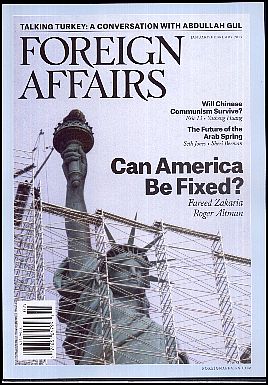Democracy v. Terror, round 1

I just finished an interesting piece by F. Gregory Gause II in the Sept./Oct. issue of Foreign Affairs. In it, he says if the US really backs insta-democracies in the Middle East, it's shooting itself in the foot regarding future relations with those countries. Many of would go to some sort of Islamic rule if allowed to truly be democratic, and the foreign policy of those new Islamic countries would be even more antithetical to US interests in the area.
Sounds fair. But his weak evidence -- comparing India (a democracy) to China (authoritarian) verges on bizarre. Taking his point to its logical conclusion, democracy may actually encourage terrorism. Hooray! Let's all become authoritarian to stop terrorism! It works in China, after all . . .
His two real suggestions? First, the US should put more energy into supporting the development of moderate, non-Islamic parties. Second, the US should seriously considering giving up its democracy-at-all-cost position because it's not realistic and may even be potentially dangerous.
Fair enough, but why should the US support moderate, non-Islamic parties if they don't really represent how the people feel? Is the solution to simply go back to supporting "terror-reducing" authoritarian regimes? What's the real goal here?
Simply put, the US can't give up its support for democracy in the Middle East, at least in this administration. Plus, pushing democracy is an excellent policy cover for a whole host of desired changes in the region, not the least of which is a realignment of state types in countries critical to US security. Clearly the days of cooperating with obvious dictators is over. But just like the US needed to keep its thumb on maverick dictators, the US simply can't afford to let democracy run willy-nilly without, for its own sake, without setting the scene for a reliable outcome.
And what if it is Islamic governments? Use them, for crying out loud. It's the same principle, really - understand them better than they do, predict their behavior, and then interfere with policy choices that are bad for US policy and interests. The US has to stop being so scared of theocracies and religious governments.
The problem is the West simply doesn't understand these kinds of governments. I believe religious governments are even easier to understand and control, since their actions are dictated by a framework that has limits and practically a standard platform. Dedicated learning will quickly erase fear born of misunderstanding. That doesn't mean the US has to promote Islamic governments. But doesn't it make sense to give the people what they want, while you manipulate it under their nose?
So - all of this may be the basis for a paper for my "international politics in the Middle East" class. We'll see.


3 Comments:
Your blog is creative Keep up the great work. Here's a subject that interests many; how to buy & sell ring on interest free credit; pay whenever you want.
9:10 AM, September 08, 2005
Tim - do you mean if a government is tolerant, they tend to be less religious? I'm a bit confused, sorry...
3:20 PM, September 08, 2005
Hm. I wonder if the religious government in Iran is easier to control than the secular one in, say, Syria.
5:09 PM, September 23, 2005
Post a Comment
<< Home